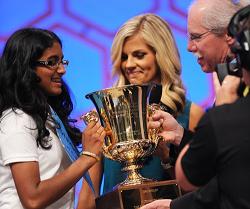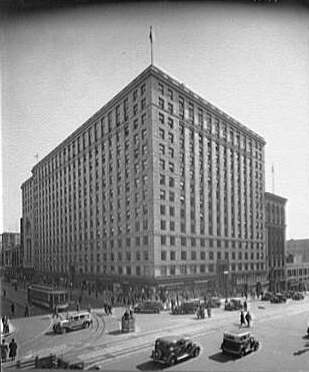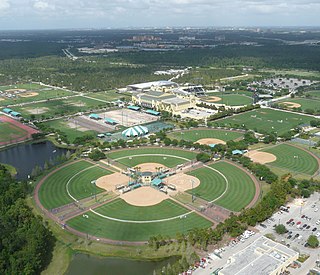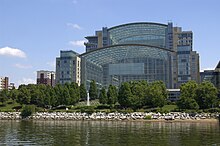The 79th Scripps National Spelling Bee was held in Washington, D.C., on May 31 and June 1, 2006. For the first time in the Bee's history, ABC broadcast the Championship Rounds on primetime television.

The 81st Scripps National Spelling Bee finals took place on May 30, 2008.

The Scripps National Spelling Bee, formerly the Scripps Howard National Spelling Bee and often referred to as the National Spelling Bee or simply “the Spelling Bee” in the United States, is an annual spelling bee held in the United States. The bee is run on a not-for-profit basis by The E. W. Scripps Company and is held at a hotel or convention center in the Washington, D.C. metropolitan area during the week following Memorial Day weekend. Since 2011, it has been held at the Gaylord National Resort & Convention Center hotel in National Harbor in Oxon Hill, Maryland, just outside Washington D.C. It was previously held at the Grand Hyatt Washington in Washington D.C. from 1996 to 2010.

The 83rd Scripps National Spelling Bee was an event held from June 2, 2010, to June 4, 2010, at the Grand Hyatt Washington, Washington D.C., United States of America.

The 84th Scripps National Spelling Bee was held from May 31 – June 2, 2011 at the Gaylord National Resort & Convention Center in Oxon Hill, Maryland near Washington, D.C. The champion was 14-year-old Sukanya Roy, who was the ninth Indian-American champion in the past thirteen competitions.

The 85th Scripps National Spelling Bee was held at the Gaylord National, in Oxon Hill, Maryland from May 27 to May 31, 2012, and was broadcast live on ESPN3. The championship finals occurred on May 31, 2012.

The 87th Scripps National Spelling Bee was held from May 27 to May 29, 2014 at the Gaylord National in Oxon Hill, Maryland and was broadcast live on ESPN3, ESPN2, and ESPN for the preliminary, semifinal, and final rounds respectively. Ansun Sujoe of Fort Worth, Texas and Sriram Hathwar of Painted Post, New York won the competition, making the 87th Bee the twelfth in the past sixteen competitions to have an Indian-American champion.

The 24th Scripps National Spelling Bee was held in Washington, District of Columbia on May 25, 1951, sponsored by the E.W. Scripps Company, at the National Press Club.

The 31st Scripps National Spelling Bee was held in Washington, District of Columbia on June 11–12, 1958, by the E.W. Scripps Company.
The 77th Scripps National Spelling Bee was held on June 1–3, 2004 in Washington D.C.

The 36th Scripps National Spelling Bee was held in Washington, D.C., on June 12–13, 1963, sponsored by the E.W. Scripps Company.
The 76th Scripps National Spelling Bee was held on May 28–29, 2003, in Washington D.C.
The 72nd Scripps National Spelling Bee was held in Washington, D.C., on June 2–3, 1999, sponsored by the E.W. Scripps Company.
The 70th Scripps National Spelling Bee was held in Washington, D.C., on May 28–29, 1997, sponsored by the E.W. Scripps Company.

The 89th Scripps National Spelling Bee was held at the Gaylord National Resort & Convention Center in National Harbor, Maryland on May 24–26, 2016.

The 90th Scripps National Spelling Bee was held at the Gaylord National Resort & Convention Center in National Harbor, Maryland, United States from May 30 to June 1, 2017, with "Bee Week" events running for spellers between May 28 and June 3, and televised coverage on May 31 and June 1. Ananya Vinay, 12, won the competition by successfully spelling "marocain" in the final round. She had also placed 172nd place in the 2016 Scripps National Spelling Bee.

The 91st Scripps National Spelling Bee was held at the Gaylord National Resort & Convention Center in National Harbor, Maryland from May 29 to 31, 2018. The winner was 14-year-old Karthik Nemmani, an eighth grader from McKinney, Texas, who correctly spelled "koinonia" for the win. Due to a rule change in how spellers can make it to the Bee, the bee's total field of 515 spellers was a large increase over prior years.

The 93rd Scripps National Spelling Bee was held at the ESPN Wide World of Sports Complex in Bay Lake, Florida. The finals were held on July 8, 2021, and televised on ESPN2 and ESPN. It was won by Zaila Avant-garde, the first African American to win the Scripps National Spelling Bee, and the second black person to do so.

The 94th Scripps National Spelling Bee was a spelling bee that was held at Gaylord National Resort & Convention Center in National Harbor, Maryland. The finals were held on June 2, 2022, and televised on Ion Television and Bounce TV, marking the first time in 27 years that the Bee was not televised on an ESPN network. The winner of the bee was Harini Logan, an 8th–grade girl from San Antonio, Texas, who won with 21 words spelt correctly during the Bee's first spell-off round.










